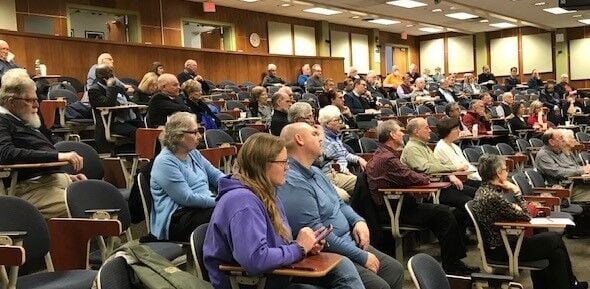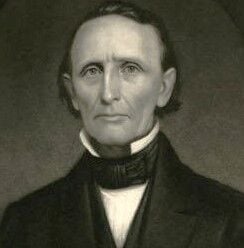More than 80 gathered Saturday at Gettysburg College to observe the 225th birthday of local Lutheran leader Samuel Simon Schmucker. (Photo Courtesy of Michael Cooper-White, now working at Union Seminary, NYC.)
As a young man in the 1820s, Schmucker had three goals: to establish a theological seminary, a preparatory academy, and translate a German theology book into English.
Within a decade after his arrival in Gettysburg at age 27, he had founded both the Lutheran Seminary and today’s Gettysburg College, as well as helped establish Christ Lutheran Church. Major campus buildings are named in honor of Schmucker at both the seminary and college.
Schmucker’s legacy expanded beyond his initial goals as he became a prominent citizen involved in founding Evergreen Cemetery, where his grave resides on a high point of the burial grounds.
Other callings would come Schmucker’s way, which propelled him to become a nationally and internationally recognized church leader.
He played a major role as Lutheran congregations formed the General Synod, including writing its constitution. Schmucker traveled to Europe to raise funds and collect books from continental Lutherans for his fledgling seminary.
The Schmucker legacy was celebrated by a series of speakers at Saturday’s commemorative event, sponsored by several college departments, Christ Lutheran Church, and the Lutheran Historical Society of the Mid-Atlantic.
Leading off was the Rev. Dr. Maria Erling, Professor of Modern Church History and Global Mission at United Lutheran Seminary (ULS). In her lecture on “Schmucker’s Long Shadow,” Erling described how the pioneering leader confronted challenges posed by a divided Lutheran church and polarized American society.
Lutherans in the 19th century disagreed fervently over matters of doctrine, and Americans were divided over slavery. While taking a stand against slavery, Erling said, Schmucker attempted to preserve unity among Lutherans and forge collaboration with other protestants as well.
“Schmucker concluded the western frontier demanded a new approach that was not exclusively Lutheran,” Erling said. But his new approaches were not embraced by more conservative ecclesial contingents, so Schmucker ended up being “skewered in both doctrinal debates and over slavery.”



